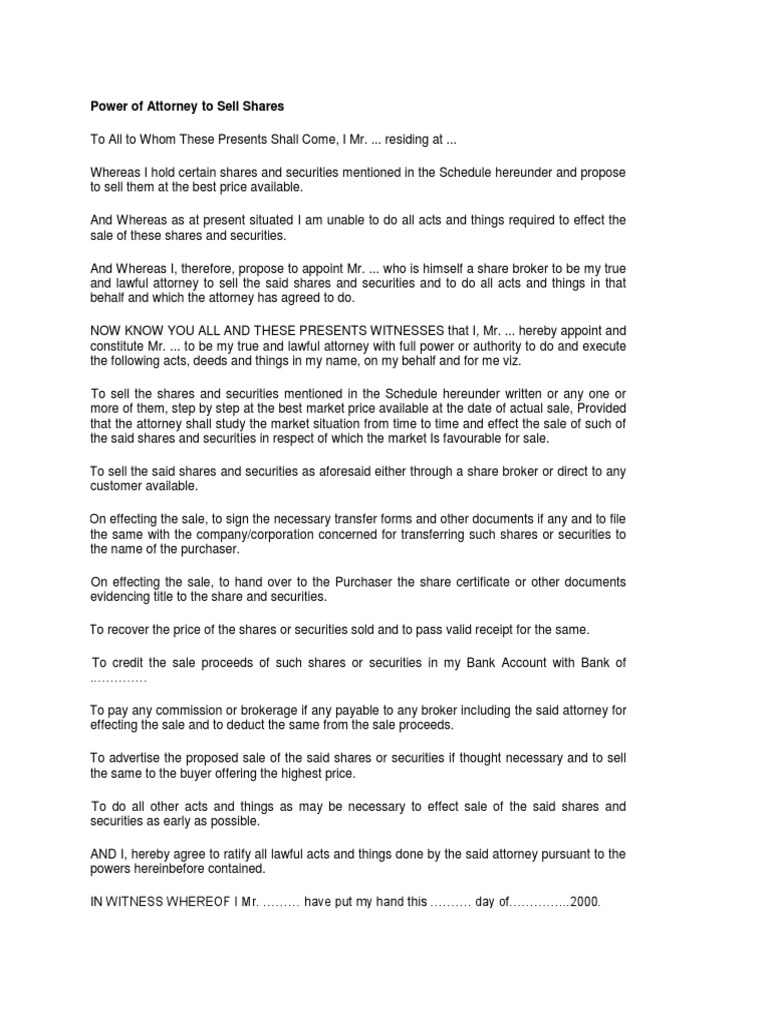It’s a question many find themselves pondering during challenging times: “Can I sell my parents’ house with Power of Attorney?” This inquiry opens a box brimming with emotions, logistical challenges, and legal nuances. With the complexities surrounding familial roles and asset management, let’s delve into this arrangement and uncover the intricacies of handling property under a Power of Attorney (POA).
First, let’s establish what a Power of Attorney actually is. In essence, a POA is a legal document that authorizes one person, known as the “agent” or “attorney-in-fact,” to act on behalf of another person, referred to as the “principal.” The principal can grant broad powers or limited ones, depending on their specific needs. Now, imagine being bestowed with such authority—it’s invigorating yet daunting. Are you ready to handle your parents’ estate?
As the custodian of their financial affairs, selling a house can seem straightforward. You sign on the dotted line, hand over the keys, and voilà—the property is sold. However, the labyrinth of legal stipulations may present hurdles that challenge even the most diligent individuals. To navigate this journey, several key points must be considered.
First, is the Power of Attorney valid? Not all POAs are created equal. Some might be general, covering various aspects of the principal’s life—financial, medical, or both. Others may only be specified for certain transactions. If the document is outdated, revoked, or lacks the necessary signatures, your authority could evaporate like morning mist. Thus, it is imperative to ensure that the POA is in full force and includes real estate transactions.
Next, consider the jurisdiction. State laws govern the nuances of POA, and these regulations can vary dramatically. For instance, some states might impose additional requirements for selling real estate, such as the necessity of a notary or witnesses. Moreover, if your parent is incapacitated, many jurisdictions require a durable POA, specifically granting permission for such decisions when they can no longer act on their own. Therefore, understanding the local governance surrounding this legal tool is crucial.
A playful question arises: what if your parents aren’t on board with the idea? Engaging in a heartfelt discussion about their wishes can be the cornerstone of your journey. Are there underlying sentiments tied to the house? Memories, aspirations, or even the fear of losing control over their legacy? A house often symbolizes much more than mere bricks and mortar—it encapsulates stories, laughter, and familial bonds. This conversation can help illuminate the path forward, ensuring that everyone is in agreement before any action is taken.
If, after these discussions, the consensus leans toward selling, another consideration comes into play: the financial implications. The sale of a property involves more than just a simple transaction. It encompasses staff fees, taxes, and the potential need for repairs or staging to maximize value. It’s worth engaging an experienced real estate agent who can guide you through this terrain, ensuring that you secure the best possible outcome for your parents’ investment.
This leads us to another riveting aspect: preparing the property for sale. The home should be in tip-top shape, showcasing its potential to prospective buyers. Are there repairs needed? Perhaps a fresh coat of paint or improved landscaping to enhance curb appeal? Conducting a thorough inspection can reveal hidden treasures—or lurking issues—that might deter potential buyers. Investing in sprucing up the property can yield substantial returns in the long run.
Once the property is listed, ready to entice buyers, there remains the legal process. During the closing stages, various documents will need to be prepared, including the purchase agreement and disclosures. You, acting as agent, will need to provide verification of your authority through the Power of Attorney document, proving your right to execute the sale. This critical step reinforces the importance of having all paperwork meticulously organized and accessible.
Yet, even amidst an orchestrated plan, the unexpected can emerge. Perhaps a buyer backs out at the last minute, or negotiations become fraught with complications. It’s essential to maintain a fortitude rooted in patience and resilience. Keeping your parents informed every step of the way can alleviate anxieties and reinforce trust. After all, your journey represents more than just a transaction; it demonstrates commitment and love.
So, can you sell your parents’ house with Power of Attorney? The answer is a tentative yes, but it comes with strings attached, best addressed through careful planning, open communication, and a keen understanding of legalities. Ultimately, this experience isn’t solely about property; it’s about weaving a narrative that honors your parents’ legacy while ensuring their wishes are paramount. Tackling this endeavor with both reverence and rigor can pave the way for a successful sale, benefitting not only your parents but also your family as a whole.
In conclusion, navigating the sale of a house with Power of Attorney is a venture that intertwines legal, emotional, and financial threads. With diligence, empathy, and a comprehensive grasp of the powers you hold, this complex challenge can unfold into a seamless transaction, honoring the past while paving the way for the future.
